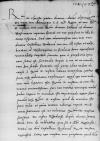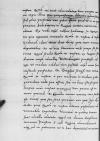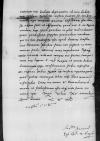De arca iam obtinueram a sacra ⌊maiestate regia⌋, ut eam Reverendissimae Dominationi Vestrae una cum reverendissimo ⌊domino Culmensi⌋ et ⌊domino thesaurario⌋ aperire liceret ac eas, quae sunt in illa, litteras inscpicere. Sed cum communicassem eam rem cum domino ⌊castellano Gedanensi⌋, non erat illi visum, ut adhiberetur dominus thesaurarius, ne saecularis homo cognosceret venerabilis capituli secreta, quae a prophanis ignorari satius est. Contendit itaque a me, ut ne mandatum hoc scribi facerem, nisi prius alias eadem de causa a Reverendissima Dominatione Vestra litteras accepissem, quibus suam mihi voluntatem explicaret. Quod ego, cum viderem eum legatum esse Reverendissimae Dominationis Vestrae et cum illa vivere coniunctissime, feci non invitus, utcumque multum habui negotii in mandato isto impetrando. Quare significabit mihi Reverendissima Dominatio Vestra, quid de mandato isto fieri velit et quem tertium adiungi cupiat. Mihi curae futurum est, ut voluntati Reverendissimae Dominationis Vestrae satisfiat.
De ⌊castro Rhedensi⌋ deque domino ⌊Ioanne Stutt⌋, tum de ⌊abbatibus⌋, quae sit sacrae ⌊maiestatis regiae⌋ sententia, ex domino ⌊castellano Gedanensi⌋ Reverendissima Dominatio Vestra cognoscet. Cuius ego causam, cum propterea, quod litteris Vestrae Reverendissimae Dominationis erat commendatus, tum propter animi erga illum mei propensionem, libenter adiuvissem, sed plus proficere non potui, quam quod, ut in ea, qua proxime habebuntur in ⌊regno⌋ ⌊comitia⌋, reicieretur, obtinui.
Ex ⌊urbe⌋ nihil adhuc habemus. In ⌊Hungaria⌋ quae agantur, narrabit Reverendissimae Dominationi Vestrae dominus ⌊caste[ll]anus Gedanensis⌋. ⌊Idem⌋ etiam dicet de iis, quae nunc vacant, dignitatibus, ita ut vice litterarum mihi prope sit futurus. Quod scribit Reverendissima Dominatio Vestra ex ⌊regno⌋ studiorum causa nonnullos ⌊Vittenbergam⌋ proficisci, id ego, ut credam, adduci non possum, nihil enim huc eiusmodi perfertur.
De ⌊Gnapheo⌋ scripsi iam antea Reverendissimae Dominationi Vestrae, a qua maiorem in modum peto, providere velit pro officio suo, ne lues ista serpat longius, neve crescat contagio. Non parum est in mora periculi.
De concilio rumor raucus iam factus est. Omnes, quae sua sunt, quaerunt, non quae Jesu Christi. Mitto, quas Reverendissima Dominatio Vestra litteras postulavit ad venerabile ⌊capitulum Varmiense⌋, in quibus tamen sunt nonnulla immutata. Quod me domini ⌊consiliarii terrarum Prussiae⌋ sacrae ⌊maiestati regiae⌋ commendarunt atque ab ea petierunt, ut in hac dignitatum vacatione rationem mei habere dignaretur, id non dubito, quin auctore Reverendissima Dominatione Vestra factum sit. Cui hoc nomine ago magnas gratias, etsi litterae istae clausae adhuc sunt et obsignatae, quod eas sacrae ⌊maiestati regiae⌋ nondum legi, quod verebar, ne plus incommodarent, quam prodessent, propter quorundam invidiam, qui me tam gratiosum esse apud dominos ⌊consiliarios terrarum Prussiae⌋ ferre non possent ac tanto maiore studio rationes meas impedirent. Posteaquam, Deo iuvante, voti mei compos ero factus, tum primum eas legam sacrae ⌊maiestati regiae⌋, ut quanta habeam dominorum ⌊isthic consiliariorum⌋ studia, cognoscat.
De organo habeo Reverendissimae Dominationi Vestrae ingentes gratias. Quod quoties concrepet, toties mihi illius memoriam refricabit.
Cuius me amori et benevolentiae commendo et felicissimam esse atque recte sanam ex animo opto.



